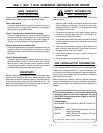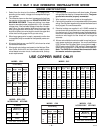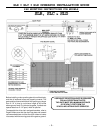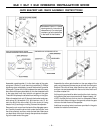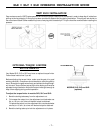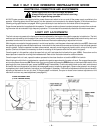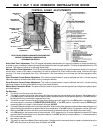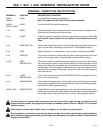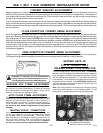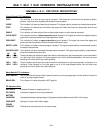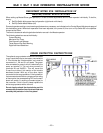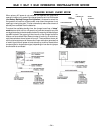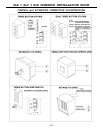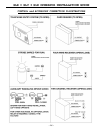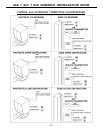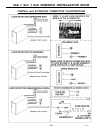
SLR • SLC • SLD OPERATOR INSTALLATION GUIDE
- 11 -
CURRENT SENSING ADJUSTMENTS
Because gates vary in construction and may have different force requirements in the open and close directions to move, the
OSCO control board has separate Multi-turn potentiometers for adjusting in both directions independently. The adjustment
should be set light enough to maintain minimal force (50-75 lbs.) should an obstruction occur, but high enough to keep the gate
moving under normal conditions without interruption.
Prior to adjusting the operator current sensing functions, make sure the gate moves freely in both directions. A badly aligned or
poorly maintained gate may cause false triggering of the current sensor. Refer to page 9 when following the instructions below.
A factory adjustment tool has been supplied to make these adjustments easier. This tool has been taped to the control box for
your convenience.
CLOSE DIRECTION CURRENT SENSE ADJUSTMENT
When the gate operator leaves the factory, it has been preset for a relatively light gate function and will require additional
adjustment. Begin by starting the gate going closed. If the operator stops and reverses, turn the close direction potentiometer
(see page 9) one turn higher, press the STOP button, and try again. Repeat this process until the gate no longer causes false
tripping of the current sensor. Note that each time the gate operator reverses, the STOP button must be pressed. Next, turn the
close direction potentiometer lower slowly while the operator is running the gate closed until the gate operator stops and
reverses again. From this point, turn the close direction potentiometer higher by 1 1/2 turns for all 115 Volt AC and 24 Volt DC
operators, and by 3/4 of a turn higher for all 230 Volt AC operators. Additional fine adjustment by 1/4 turns may be necessary to
eliminate false triggering.
OPEN DIRECTION CURRENT SENSE ADJUSTMENT
Repeat the same process with the open direction potentiometer while running the gate in the open direction. Once this is done,
run the gate through several complete cycles and make sure the gate does not false trip in either direction.
MAXIMUM RUN TIMER ADJUSTMENT
This adjustable potentiometer sets the maximum length of time
the motor will run before shutting down. It should be configured
for the time it takes to run the gate fully open or closed, plus an
additional 15 seconds. See page 9 for details.
AUTO CLOSE TIMER ADJUSTMENT
This adjustable potentiometer sets the length of time which
elapses before the gate operator automatically closes the gate,
from the fully open position, provided no open, reversing, or
obstruction signals are present. This feature can be turned on or
off via dip switch selection. See page 9 for details. Do not use
the auto close timer without an appropriate reversing device
installed!
MASTER/SLAVE CONNECTION
A three-wire shielded conductor cable is required to connect mas-
ter and slave operators. You must use Belden 8760 Twisted
Pair Shielded Cable (or equivalent) only – OSCO part number
2500-1982, per foot). See page 9 for details of this connection, as
well as dip switch selection. Note: The SHIELD wire should be
connected in both the master and slave operators. In addition,
you must run power to both the master and slave operators.
BATTERY BACK-UP
FOR DC MODELS ONLY
CHARGER BOARD CONFIGURATION
To set the voltage monitor, see the picture below. The RUN posi-
tion will monitor the voltage of the battery only after AC voltage has
been interrupted. It will allow the operator to continue to function
until the batteries have dropped to 17 volts. When the batteries
have reached 17 volts, the operator will open and shut down until
AC power has been restored. In the OPEN ONLY position when
AC power has been interrupted the operator will open and shut
down until AC power is restored.
Note: If the charger board is set to open only, removing incoming
power will cause the operator to run to full open position. Turn off
power switch in operator before removing incoming power!
VOLTAGE MONITOR SHOWN
ABOVE IN THE RUN POSITION
Multi-turn Potentiometer
Remember it is important not to set the adjustment
too high! Doing so will defeat the purpose of the cur-
rent sensing as an obstruction detecting feature.
3-05-8



